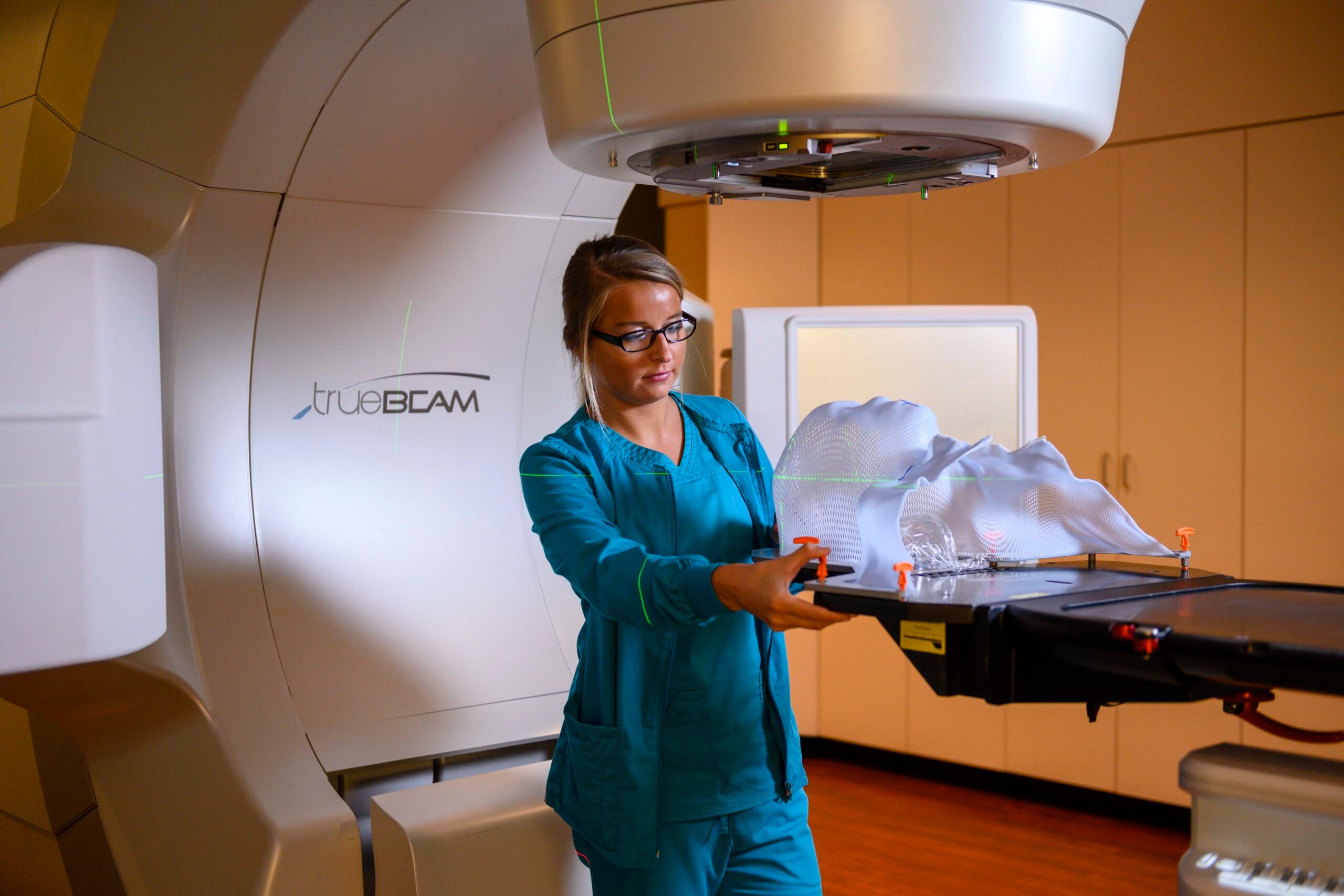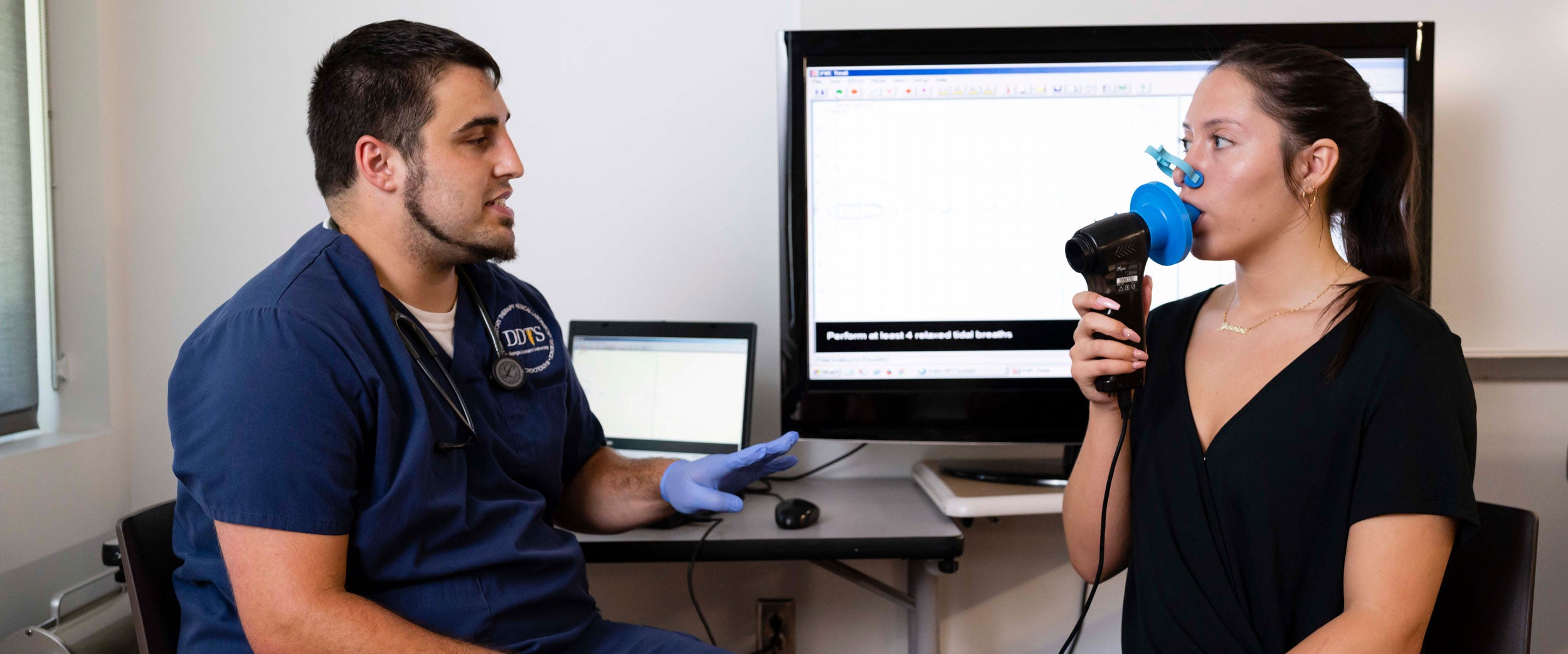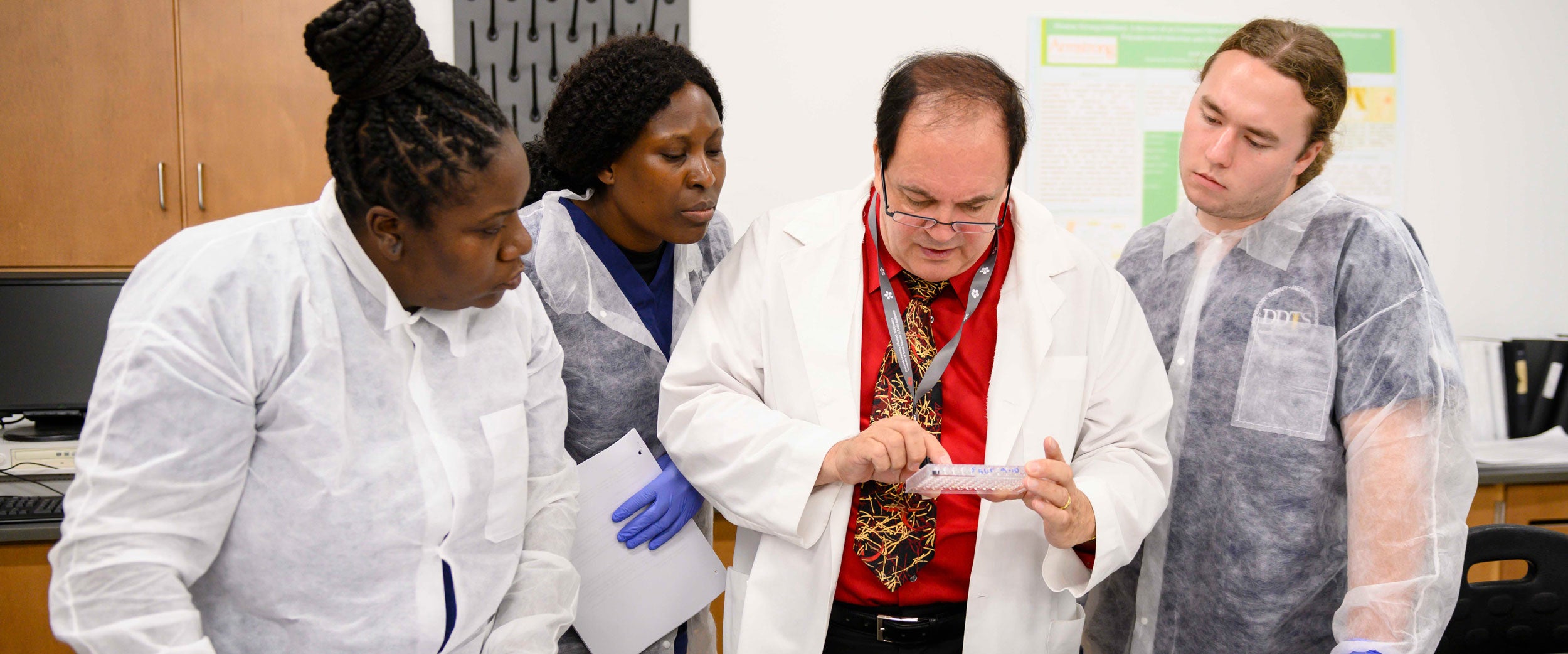Combine cutting-edge technology with compassion as you learn to treat cancer patients with radiation therapy.
Locations
- Armstrong Campus (In Person)
Why Concentrate in Radiation Therapy at Georgia Southern?
- Find purpose and meaning in caring for cancer patients.
- Gain clinical experience through rotations at top oncology clinics in the Southeast.
- Enjoy a rewarding health care career that offers job security and competitive pay.
- JRCERT-accredited program.
- 100% job placement rate.
- 130 credit hours to completion.
Radiation therapists play a significant role in a cancer patient’s journey. As a key part of the oncology team, they work directly with patients to administer precise radiation therapy
and often provide emotional support along the way.
The radiation therapy degree concentration at Georgia Southern is ideal for students who are passionate about health care, technology and making a difference. Our Radiation Therapy program emphasizes hands-on clinical experience at several prestigious clinics in the Southeast. You’ll have a chance to learn from some incredible oncology teams as you train in advanced technology and treatments.
When you graduate, you’ll be eligible to take the exam for certification by the American Registry of Radiologic Technologists.
Ready to Apply?
What Can You Do with a Concentration in Radiation Therapy?
Radiation therapists treat cancer and other diseases by administering targeted radiation therapy. They work as part of a larger medical team to help develop and deliver treatment plans, supporting patients with compassion through a challenging time in their lives.
A bachelor’s degree in radiologic sciences with a concentration in radiation therapy prepares you for a variety of high-demand health care roles, such as radiation therapist, chief therapist and cancer center director. You can also use your degree as a stepping stone for further education to advance your career and become a dosimetrist, oncologist or medical physicist.
Radiation therapists deliver care in a number of settings, typically working closely with oncology teams. You might find yourself treating patients at a hospital oncology department, an outpatient clinic, a physician’s office, a research institution or cancer treatment center.
Where our graduates work:
- Siemens Healthineers – Varian
- Vision RT
- Medical University of South Carolina
- M.D. Anderson Cancer Center
- Memorial Sloan Kettering Cancer Center
- City of Hope
- Duke Cancer Center
What our graduates do:
- Radiation therapist
- Dosimetrist
- Chief radiation therapist
- Clinical applications director
What You’ll Learn
You’ll start by laying groundwork in physics, math and science. The majority of your advanced courses will cover the principles of radiation therapy, including patient care, treatment and dose preparation, radiation production, radiation therapy equipment operation and radiation safety. During your clinical education, you’ll put your learning into practice and hone your clinical skills by caring for real patients as part of working medical teams.
In addition to core curriculum classes, every radiologic sciences student completes courses on patient care, research methodologies, leadership and management, advanced radiologic sciences and medical communication skills.
The first year of the Radiation Therapy program requires students to be on campus for all didactic courses. Beginning in the third semester, the program consists of a combination of primarily online didactic courses, as well as clinical requirements. Minimal in-person attendance is required in the final three semesters, but students are expected to come to campus one day a week in the fourth semester of the program.
See the CurriculumBuild Your Experience
Equip yourself for a successful career in radiation therapy by getting the most from Georgia Southern’s robust Radiologic Sciences resources and community.
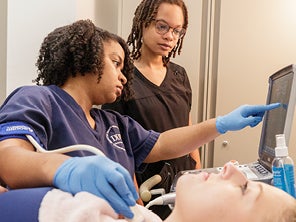
Real-World Experience
Rotate through several prestigious oncology clinics around the Southeast, building your clinical skills and learning from advanced medical teams as you care for cancer patients.
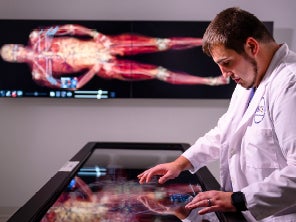
Student Organizations
Find community by joining student groups such as the Health Sciences Student Association (HSSA).
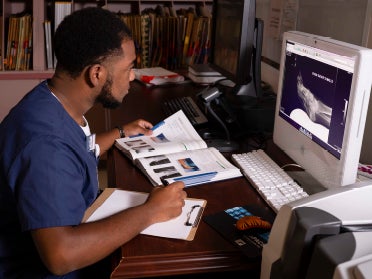
Hands-On Training
Build your expertise as you learn how to operate sophisticated equipment and technology in our state-of-the-art clinic.
Take Action
Applications for the radiologic sciences program with a concentration in Radiation Therapy are accepted from Nov. 15 through March 1.
Late applications will be considered on a case-by-case basis. Qualified applicants who met the March 1 deadline will be granted priority over applicants who did not meet the initial deadline. Certain programs may continue to review applications after the deadline until the program’s capacity is met.
Admission to Georgia Southern University does not guarantee admission to the concentrations in radiologic sciences. The Department of Clinical Sciences has a separate formal admissions process in addition to the admission process for the University. Applicants must submit a formal application to the program of interest and transcripts of all college and technical school coursework.
Follow these steps to complete the Georgia Southern application:
- Create an application account.
- Complete our online application using the PIN you received after creating your application account.
- Once complete, pay the $30 application fee or upload a valid fee waiver. Previous Georgia Southern applicants and dual enrollment students do not need to pay the fee.
- You can check your application status at My.GeorgiaSouthern.edu/admissions three days after completing your application. This page contains live information about your admission status, including a checklist of missing documents we need to make a decision.
Applicants to the radiologic sciences program must meet these minimum admission requirements:
- Acceptance into Georgia Southern University.
- Create an account, complete and pay the Allied Health Centralized Application Service (AHCAS) Application.
- Complete the entrance exam and submit the results by March 1. Applicants may contact the Georgia Southern University Testing Services at 912-344-2582 or visit MCC 206 for more information or to schedule the exam.
- Achieve a cumulative GPA of 2.5 or higher for all college work. Applicants with less than a 2.5 may be considered under special circumstances.
- Students who are admitted to the program are strongly encouraged to complete the remaining core courses during the summer semester before the start of the program. Failure to meet all core requirements before beginning the program may delay your graduation.
- Prior to applying to the program, you must complete the following:
- 50 semester hours of core degree requirements, which include two college English composition courses and college algebra or higher.
- Required lab sciences (significant preference for admission will be given to those applicants that have completed all of the five required sciences):
- Radiation Therapy – must include Human Anatomy and Physiology I and II with labs, Physics with lab or Physical Environment with lab, and one additional lab science in the program of study.
Applicants not meeting the criteria stated above may apply and will be considered under special circumstances at a later date.
A new class begins in August (fall semester) each year. Applications will be considered on a competitive basis, and written notification of acceptance will begin in late March (no one will be notified of acceptance by phone). Applications received after the submission deadline will be considered only if seats are available. The amount of completed coursework, the number of science courses completed, entrance exam scores and GPA determine competitiveness. Additional points may be awarded for completion of selected coursework in the major. Interviews may be required for qualified candidates. Please see your advisor for details.
Please note that prior conviction of a felony or misdemeanor may prevent you from sitting for the national certification examination. If you have been convicted of either a felony or misdemeanor, you must complete the pre-application review process as prescribed by the certification agency and provide the Department with verification of eligibility for the examination.
Georgia Southern University is an equal-opportunity education institution and does not discriminate based on sex, race, age, religion, sexual orientation, disability, or national origin in employment, admissions or activities.
Apply as a First-Year Student Transfer to Georgia SouthernThe Radiation Therapy degree concentration at Georgia Southern University is accredited by the Joint Review Committee on Education in Radiologic Technology. The program’s current award is accredited for a period of 8-years. General program accreditation information and the current accreditation award letter can be found here.
JRCERT
20 North Wacker Drive, Suite 2850
Chicago, IL 60606-3182
312-704-5300
mail@jrcert.org
The following is the most current program effectiveness data for the radiation therapy program at Georgia Southern University. Our programmatic accreditation agency, the Joint Review Committee on Education in Radiologic Technology (JRCERT), defines and publishes this information.
Credentialing Examination: The number of students who pass, on the first attempt, the American Registry of Radiologic Technologists (ARRT) certification examination, or an unrestricted state licensing examination, compared with the number of graduates who take the examination within six months of graduation. The five-year average benchmark established by the JRCERT is 75%.
Credentialing Examination Rate
Number passed on 1st attempt divided by number attempted within 6 months of graduation.
Year Results
Year 1-2019 12 of 13-92%
Year 2-2020 3 of 7-43%
Year 3-2021 5 of 7-71%
Year 4-2022 11 of 12-92%
Year 5-2023 10 of 13 -77%
Program 5-Year Average 41 of 52-78.8%
Job Placement: The number of graduates employed in the radiologic sciences compared to the number of graduates actively seeking employment in the radiologic sciences within twelve months of graduating. The five-year average benchmark established by the JRCERT is 75%.
Job Placement Rate
Number employed divided by number actively seeking employment within 12 months of graduation.
Year Results
Year 1-2019 12 of 12-100%
Year 2-2020 5 of 5-100%
Year 3-2021 4 of 4-100%
Year 4-2022 11 of 11-100%
Year 5-2023 12 of 12-100%
Program 5-Year Average 44 of 44-100%
Program Completion: The number of students who complete the program within the stated program length. The annual benchmark established by the program is 75%.
Program Completion Rate
Number graduated divided by number started the program.
Year Results
Year-2023 13 of 13Annual Completion Rate 100.0%
GOAL 1: Students/Graduates will be clinically competent.
- All students will demonstrate satisfactory clinical performance.
- All students will demonstrate the ability to retain and apply clinically learned skill sets.
GOAL 2: Students/Graduates will possess critical thinking skills.
- Students will demonstrate the ability to perform basic dosimetry calculations.
- Students will demonstrate the ability to perform a new treatment start.
GOAL 3: Students/Graduates will possess effective communication skills.
- Students will demonstrate effective oral communication skills.
- Students will demonstrate written communication skills.
GOAL 4: Students/Graduates will demonstrate growth in professional development.
- Graduates will acknowledge the need for professional growth.
- Graduates will renew their membership in a professional organization.
The Department of Clinical Sciences anticipates that graduates of this program will seek the following professional state licenses or national certifications: Registered radiation therapist, R.T.(T). ARRT and state licenses
The Department of Clinical Sciences has determined that the required classes and educational activities of this academic program will qualify a graduate of this program to take the national ARRT examination to obtain Registered Radiation Therapist, RT(T)(ARRT) credentials. The department has not determined whether this program satisfies the requirements of all states and territories for the Registered Radiation Therapist, RT(T) or state licensure. Visit the American Society of Radiologic Technologists to determine the requirements of your state or territory.
For all online programs, federal law requires colleges and universities to make certain disclosures to prospective students of these programs. These disclosures include information on the University’s authority to operate outside of Georgia, the complaint processes, adverse actions, refunds, and program closure. For required disclosures about online programs offered by the University, visit the Georgia Southern State Authorization and Professional Licensure page.
Clinical education courses will be taken during the last three semesters of the program and require that all students rotate through a minimum of 3 different clinical sites. The majority of the radiation therapy clinical sites are located outside of the city of Savannah (most within a 250 mile radius from the Armstrong Campus) and all students must rotate through a site outside of Savannah. Clinical rotations require 24-32 hours per week and students are responsible for all transportation and lodging expenses when enrolled in clinical education courses.
While most didactic courses are offered online in the last three semesters of the program, travel to campus will be required for didactic courses not offered online when the student is enrolled in clinical education courses.
Many of the clinical programs offered by the Waters College of Health Professions require a clinical internship or practicum experience to fulfill degree requirements. Pursuant to the University’s legal agreements, participants in clinical experiences are required to abide by the workplace rules of the clinical site. Sometimes these rules include vaccination requirements. As always, WCHP will continue to make every effort to place students at clinical sites. However, please be aware that we may be unable to locate a site to accept unvaccinated students, which may cause a delay or inability to progress and complete the program of study.
Related Programs
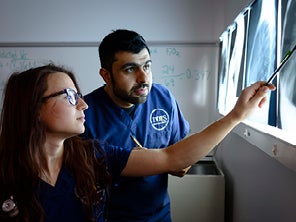
Take the Next Step
Make a powerful impact on patients’ lives every day. Learn more about the radiation therapy program at Georgia Southern.
Contact Us
Program Director
Laurie Adams
Department Chair and Associate Professor
Phone: 912-344-3382
laadams@georgiasouthern.edu
Radiologic Sciences
Phone: 912-344-2550
radsci@georgiasouthern.edu
Department of Clinical Sciences
Georgia Southern University Armstrong Campus
Department 4902
11935 Abercorn Street
Savannah, GA 31419

